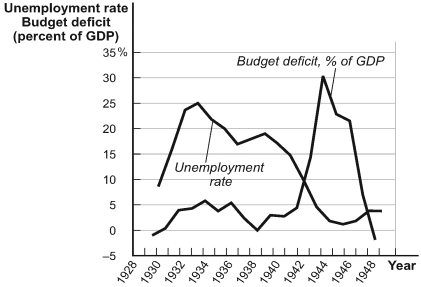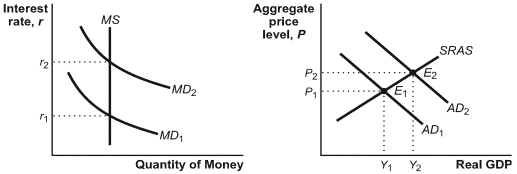Exam 17: Macroeconomics: Events and Ideas
Exam 1: First Principles183 Questions
Exam 2: Economic Models: Trade-Offs and Trade341 Questions
Exam 3: Supply and Demand230 Questions
Exam 4: Price Controls and Quotas: Meddling With Markets187 Questions
Exam 5: International Trade224 Questions
Exam 6: Macroeconomics: the Big Picture128 Questions
Exam 7: GDP and the CPI: Tracking the Macroeconomy213 Questions
Exam 8: Unemployment and Inflation300 Questions
Exam 9: Long-Run Economic Growth268 Questions
Exam 10: Savings, Investment Spending, and the Financial Syst355 Questions
Exam 11: Income and Expenditure114 Questions
Exam 12: Aggregate Demand and Aggregate Supply308 Questions
Exam 13: Fiscal Policy120 Questions
Exam 14: Money, Banking, and the Federal Reserve System135 Questions
Exam 15: Monetary Policy316 Questions
Exam 16: Inflation, Disinflation, and Deflation194 Questions
Exam 17: Macroeconomics: Events and Ideas283 Questions
Exam 18: International Macroeconomics411 Questions
Select questions type
The Great Moderation consensus includes the idea that the central bank should be independent of politics.
(True/False)
4.8/5  (32)
(32)
Discretionary fiscal policy may destabilize the economy because of lags in implementing policy and lags in the effect of fiscal policy on the economy.
(True/False)
4.8/5  (36)
(36)
_____ macroeconomists focused on the _____ effects of _____ policy on the aggregate price level, ignoring any _____ effects on aggregate output.
(Multiple Choice)
5.0/5  (44)
(44)
Which school of thought believes that expansionary monetary policy is effective in fighting recessions? I. classical macroeconomics
II) Great Moderation consensus
(Multiple Choice)
4.7/5  (37)
(37)
According to Keynes, changes in business confidence are often responsible for business cycles.
(True/False)
4.9/5  (30)
(30)
Some economists believe that fluctuations in the growth rate of total factor productivity cause business cycles.
(True/False)
4.7/5  (36)
(36)
The Great Moderation consensus among macroeconomists is that fiscal policy should be used sparingly because:
(Multiple Choice)
4.8/5  (29)
(29)
Keynesians argued that monetary policy would NOT be effective if:
(Multiple Choice)
4.8/5  (46)
(46)
The policies that seemed to be effective during the Great Moderation seemed to be inadequate to fight the Great Recession.
(True/False)
4.8/5  (50)
(50)
Many economists favored using discretionary fiscal policy during the Great Recession because monetary policy could not be used when interest rates were near zero.
(True/False)
4.8/5  (32)
(32)
Keynes believed that wages and prices were sticky. Therefore, a rightward shift of the aggregate demand curve would cause a(n):
(Multiple Choice)
4.8/5  (37)
(37)
Use the following to answer questions:  -(Figure: Fiscal Policy and the End of the Great Depression) Refer to Figure: Fiscal Policy and the End of the Great Depression. The period from 1936 to 1938 would seem to indicate that in the short run a decrease in government deficit spending can _____ the unemployment rate.
-(Figure: Fiscal Policy and the End of the Great Depression) Refer to Figure: Fiscal Policy and the End of the Great Depression. The period from 1936 to 1938 would seem to indicate that in the short run a decrease in government deficit spending can _____ the unemployment rate.
(Multiple Choice)
4.8/5  (36)
(36)
Rational expectations theory suggests that people and firms base their expectations on:
(Multiple Choice)
4.7/5  (33)
(33)
Which statement is a point of the Great Moderation consensus? I. Monetary policy should be the main stabilization policy.
II) The central bank should be independent of political influence.
III) Discretionary fiscal policy should be used sparingly.
(Multiple Choice)
5.0/5  (44)
(44)
Economists who agree with the Great Moderation consensus believe that monetary policy can keep unemployment below the natural rate.
(True/False)
4.8/5  (42)
(42)
Use the following to answer questions:  -(Figure: Fiscal Policy with a Fixed Money Supply) Refer to Figure: Fiscal Policy with a Fixed Money Supply. Assume that this economy is at E2. Now government deficit spending is decreased, but the Federal Reserve expands the money supply. According to this model:
-(Figure: Fiscal Policy with a Fixed Money Supply) Refer to Figure: Fiscal Policy with a Fixed Money Supply. Assume that this economy is at E2. Now government deficit spending is decreased, but the Federal Reserve expands the money supply. According to this model:
(Multiple Choice)
4.7/5  (33)
(33)
In the 1970s and first half of the 1980s, the U.S. economy had low inflation and low unemployment.
(True/False)
4.9/5  (41)
(41)
The Great Moderation consensus is that the policy makers of the central bank should be elected so that they are responsible to the voters.
(True/False)
4.8/5  (39)
(39)
Showing 141 - 160 of 283
Filters
- Essay(0)
- Multiple Choice(0)
- Short Answer(0)
- True False(0)
- Matching(0)